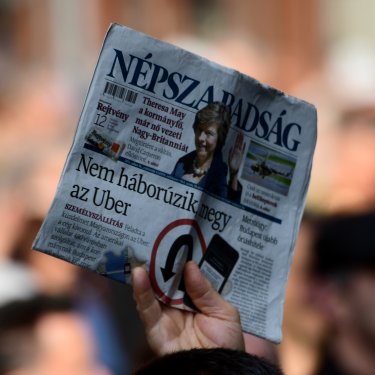Hungary: Orbán allies acquire regional press monopoly

Reporters Without Borders (RSF) deplores the purchase of Hungary’s last five independent regional newspapers by oligarchs allied with Prime Minister Viktor Orbán. Their acquisition in the past few days is the latest attack on pluralism in a country where the government keeps extending its control over the media.
Ten months after the independent national daily Népszabadság’s sudden closure last October, supporters of the ruling Fidesz party now control all of Hungary’s regional dailies. Orbán’s latest media “bag” was preceded by the purchase of 13 regional newspapers by an old school friend in December.
“In less than a year, Fidesz has extended its sway over the entire regional press,” RSF said. “This sounds the knell for media independence in Hungary.”
Orbán trio
Andy Vajna, a former Hollywood producer and Orbán buddy, began acquiring the Lapcom press group, which publishes the newspapers Kisaföld and Délmagyarország, at the end of last month.
The Austrian press firm Russmedia announced on 31 July that it was selling the Hungarian local newspapers Hajdú-Bihari Napló, Észak-Magyarország and Kelet-Magyarország. Their buyer is none other than Heinrich Pecina, Népszabadság’s former owner, who was blamed at the time for its closure last October. It was also Pecina who facilitated the purchase of Mediaworks, the publisher of the 13 other regional dailies, by Orbán’s former school friend, Lőrinc Mészáros, in December.
The manoeuvring by the Pecina-Vajna-Mészáros trio, which has ended up with a monopoly of Hungary’s 18 regional newspapers, has taken media concentration in this European Union member country to a new, grotesque level.
Media concentration in run-up to elections
“These latest acquisitions by ruling party supporters are further confirmation of the government’s desire to control the media,” RSF added. “This blow to regional press independence is all the most disturbing in the run-up to parliamentary elections.”
Fidesz’s control of the regional press will enhance its sway over Hungary’s 4.5 million voters when they elect a new parliament in April. Since 2010, Orbán has made no bones about his desire to extend state control over strategic sectors such as the media.
Ever since Orbán’s return to power in 2010, democracy has been in retreat in Hungary, which is ranked 71st out of 180 countries in RSF’s 2017 World Press Freedom Index.



